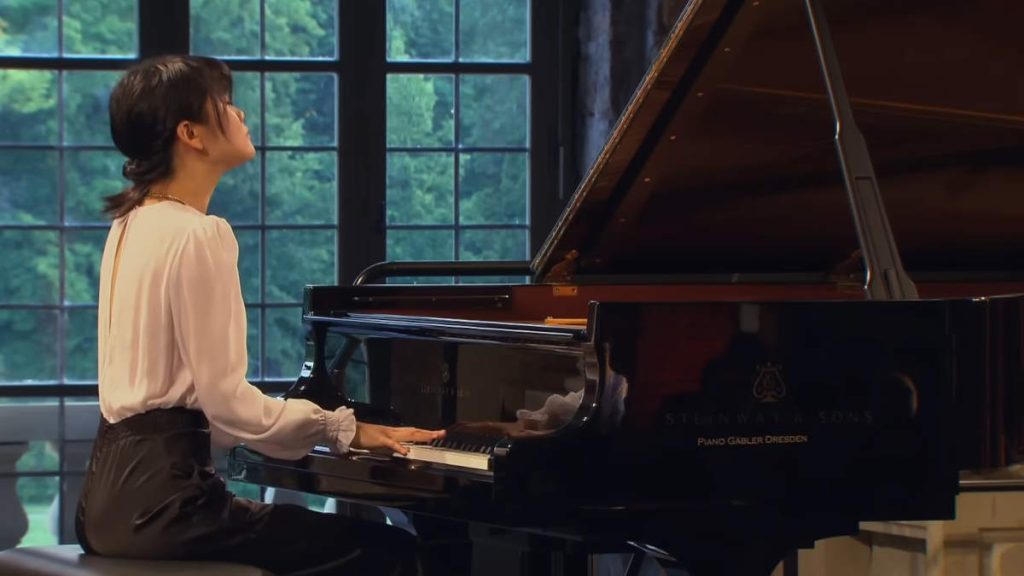Hong-Kong born American pianist Tiffany Poon plays Robert Schumann’s Kinderszenen (English: “Scenes from Childhood”), Opus 15, a set of thirteen pieces of music for piano written during the spring of 1838. This performance was recorded during the Dresden Music Festival 2023 on June 17, 2023, at the Palais im Großen Garten.
Robert Schumann’s Kinderszenen, Op. 15, “Scenes from Childhood”
Robert Schumann’s “Kinderszenen” (“Scenes from Childhood”), composed in 1838 and published in 1839, is one of the most cherished piano works of the Romantic period. Initially intended to be titled “Children’s Stories” and linked with his “Novelettes,” Op. 21, Schumann decided to publish “Kinderszenen” as a separate opus.
The cycle consists of 13 pieces, each reflecting adult reminiscences of childhood rather than music composed for children. Despite its initial lack of success, the work became highly influential, epitomizing the Romantic program miniature for piano. It also holds personal significance as a symbol of Schumann’s relationship with Clara Wieck, whom he later married.
- Von fremden Ländern und Menschen (Of Foreign Lands and Peoples) (00:21) – This piece introduces the cycle with a gentle, lyrical melody that evokes a sense of wonder and exploration, capturing the imagination of a child dreaming about distant lands and peoples.
- Kuriose Geschichte (A Curious Story) (02:02) – Playful and lighthearted, this piece suggests the unfolding of a whimsical and amusing tale, filled with unexpected twists that mirror a child’s curiosity and storytelling.
- Hasche-Mann (Blind Man’s Buff) (03:07) – Energetic and fast-paced, this piece mimics the lively action of the game “Blind Man’s Buff,” with quick runs and sudden stops representing the players’ movements.
- Bittendes Kind (Pleading Child) (03:39) – This tender piece portrays a child’s earnest plea, with a simple, repetitive melody that conveys innocence and sincerity in its gentle pleading.
- Glückes genug (Happy Enough) (04:39) – Light and joyful, this piece reflects a contented child’s happiness, using a cheerful and upbeat melody to convey a sense of uncomplicated, carefree joy.
- Wichtige Begebenheit (An Important Event) (05:17) – With a more serious tone, this piece captures the significance a child places on events that might seem trivial to adults, using bold chords and a deliberate tempo.
- Träumerei (Dreaming) (06:09) – The most famous piece of the cycle, “Träumerei” is serene and introspective, evoking a sense of peaceful daydreaming with its flowing, lyrical melody.
- Am Kamin (At the Fireside) (08:51) – Warm and cozy, this piece paints a picture of a child sitting by the fireside, perhaps listening to stories or simply enjoying the warmth, with a gentle, rocking rhythm.
- Ritter vom Steckenpferd (Knight of the Hobbyhorse) (09:47) – This lively piece portrays a child pretending to be a knight, riding a hobbyhorse with a spirited and rhythmic melody that suggests playful galloping.
- Fast zu ernst (Almost Too Serious) (10:32) – With a more contemplative and somber tone, this piece reflects a child’s rare moments of seriousness, with a thoughtful and introspective melody.
- Fürchtenmachen (Frightening) (12:40) – This dramatic piece captures the sensation of fear and the unknown, using dissonant chords and sudden dynamic changes to evoke a child’s fright.
- Kind im Einschlummern (Child Falling Asleep) (14:13) – Soft and soothing, this piece gently rocks the listener, mimicking the process of a child drifting off to sleep with its calm and repetitive phrases.
- Der Dichter spricht (The Poet Speaks) (16:16) – The concluding piece of the cycle, it serves as a reflective epilogue, with a tranquil and contemplative melody that seems to encapsulate the musings of an adult reflecting on the innocence of childhood.
“Kinderszenen” not only stands as a testament to Schumann’s compositional genius but also holds a special place in the history of Romantic piano music. It represents both a personal and artistic statement, reflecting Schumann’s deep emotions and his enduring love for Clara. The cycle’s intimate and nostalgic nature continues to resonate with audiences, making it a staple in the piano repertoire.
Tiffany Poon
Tiffany Poon (born on December 29, 1996) is a Hong Kong-born American classical pianist and vlogger who currently resides in New York City.
Poon began her piano lessons at the age of four in Hong Kong. At nine, she moved to New York to study at the Juilliard School Pre-College Division on a full scholarship under the guidance of Yoheved Kaplinsky, where she studied for eight years. She attended Calhoun School for high school, graduating in 2014. Poon then enrolled in the Columbia University/Juilliard School exchange program, studying with Emanuel Ax and Joseph Kalichstein. She graduated from Columbia University in May 2018 as a John Jay Scholar with a Bachelor of Arts in Philosophy.
Poon made her concerto debut at the age of 10 and has performed with orchestras and in recitals across the United States, Canada, Europe, Australia, and China. Notable venues where she has performed include Carnegie Hall, Steinway Hall in New York City, and Sala Mozart in Bologna, Italy. She has appeared as a soloist with the Plainfield Symphony Orchestra, Fort Smith Symphony Orchestra, ProMusica Chamber Orchestra, and Moscow Chamber Orchestra of the Pavel Slobodkin Centre.

Since 2017, Poon has been active on social media, expanding into video blogging when the COVID-19 pandemic halted live performances. By May 2021, her YouTube channel had garnered 290,000 subscribers. Poon explained, “I only started making vlogs because I thought that classical music lacked human elements. Composers are dead, and current musicians don’t really talk about themselves as humans.”
In 2020, Poon founded Together with Classical, a nonprofit charity aimed at uniting people and communities through classical music and supporting classical music education programs and opportunities.
It’s kind of sad that classical music is said to be dying, [but] it feels like I’m making an impact on the world, and I’d like to continue inspiring more generations to appreciate classical music because I’ve been getting more and more messages from my audience that they were inspired to play because of me. And that means a lot to me, because it means that I’m doing something significant and worth my time.
Tiffany Poon
Sources
- Kinderszenen on Wikipedia
- Kinderszenen, Op. 15 (Schumann, Robert) on the International Music Score Library Project website
- Robert Schumann, Kinderszenen, Op. 15 on the L.A. Phil website
- Robert Schumann, Kinderszenen, op. 15 on the Piano Library website
